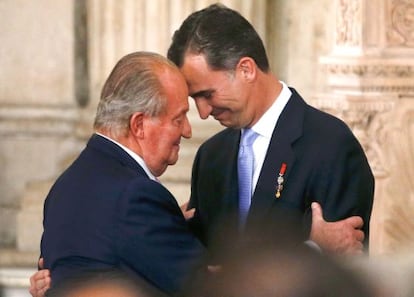Felipe — the prudent king
A year on from King Juan Carlos’s abdication, EL PAÍS columnist Francisco G. Basterra examines the direction in which his son can now take the Spanish monarchy

Just a few days ago, young King Felipe VI mentioned to me how quickly the first year of his reign had passed. “Almost without me noticing it,” he said. It’s been an astonishing 12 months for Spaniards, perhaps the most important since 1982, during which the Spanish monarchy – an institution that is incomprehensible when looked at from a purely rational perspective – has managed to regenerate, leaving the rest of the country’s institutions – from political parties to businesses from the establishment – looking rather haggard. They have been left corroded by the same fatigue that meant the previous reign could no longer continue. New leaders and parties are aspiring to make profound changes, not just substitute what already exists. The generational renewal of the monarchy sparked by the abdication of King Juan Carlos a year ago opened the doors to a new era in Spanish history.
The torch is about to be passed on to a new generation, politicians who have barely passed their 40th birthdays”
The regional and municipal elections on May 24 confirmed that the torch is about to be passed on to a new generation, politicians who have barely passed their 40th birthdays.
King Felipe VI, who is 47, belongs to that generation.
He reigns, but does not govern, over the half of Spain for whom the Transition and the 1978 Constitution are little more than a page in the history books. This is the scenario – one where citizens are demanding change and the purging of institutions – in which the new king is immersed.
The situation will be even better defined after the general elections, scheduled for later this year. The imperfect two-party system that has sustained the monarchy since Spain returned to democracy in the late 1970s looks as if it will be weakened in favor of new main figures, who do not look kindly upon the model of government left to us by the current Constitution.
The two parties that until now have taken turns in power are no longer an impregnable battleship – that vessel has been damaged, but has not yet sunk. The new agenda of change – including modifications to the Constitution, which have for so long been repressed by the Popular Party – must be tackled by Felipe VI in the second year of his reign. The head of state is a constitutional symbol of the unity and permanence of Spain. The new king has been prudent in Year I, concerned above all else to avoid making any major errors. And he has achieved that. He has made a number of gestures toward new social sectors. He has made contact with members of society from his own generation; he has not often been seen meeting with bankers or businessmen, who used to surround his father. He has had a strong presence abroad.
It has been enough for him to convey the opposite image of his father, King Juan Carlos. Queen Letizia, who has changed a huge amount, is helping him and, against all predictions, has become a key element of Felipe’s reign, which has already achieved greater harmony with this changing society.
Felipe will have to establish himself as the king of all Spaniards, including those who want to do away with many elements of Spanish life”
Felipe, meanwhile, remains a great unknown, with his thoughts on major national problems inscrutable. And soon he will no longer be able to thrive on the mere fact of being different to – or even the opposite – of his father. He knows that “felipismo” cannot substitute “juancarlismo,” which ended up in crisis in the final part of his reign. His historical mission is to properly integrate the monarchy into Spanish society, so that it forms part of the landscape, as it does in countries such as Great Britain. After the next elections, he will have to establish himself as the king of all Spaniards, including those who want to do away with many elements of Spanish life and cause the most alarm for the more conservative sectors of society.
As well as listening and responding to these new representatives, he must choose a major objective, one that will give his reign a sense of purpose. Creating an inter-generational pact that will allow for future generations to find common ground with those who fostered democratic Spain, so that they can advance together without having to start from zero. And a further step: the consolidation of the monarchy via a popular vote on its future, based on the will of those who were born after the death of dictator Francisco Franco. For them, “the Transition” to democracy sounds as far back in the past as the Carlist wars. Only then will Felipe VI be the prudent king ma non troppo.
Tu suscripción se está usando en otro dispositivo
¿Quieres añadir otro usuario a tu suscripción?
Si continúas leyendo en este dispositivo, no se podrá leer en el otro.
FlechaTu suscripción se está usando en otro dispositivo y solo puedes acceder a EL PAÍS desde un dispositivo a la vez.
Si quieres compartir tu cuenta, cambia tu suscripción a la modalidad Premium, así podrás añadir otro usuario. Cada uno accederá con su propia cuenta de email, lo que os permitirá personalizar vuestra experiencia en EL PAÍS.
¿Tienes una suscripción de empresa? Accede aquí para contratar más cuentas.
En el caso de no saber quién está usando tu cuenta, te recomendamos cambiar tu contraseña aquí.
Si decides continuar compartiendo tu cuenta, este mensaje se mostrará en tu dispositivo y en el de la otra persona que está usando tu cuenta de forma indefinida, afectando a tu experiencia de lectura. Puedes consultar aquí los términos y condiciones de la suscripción digital.









































